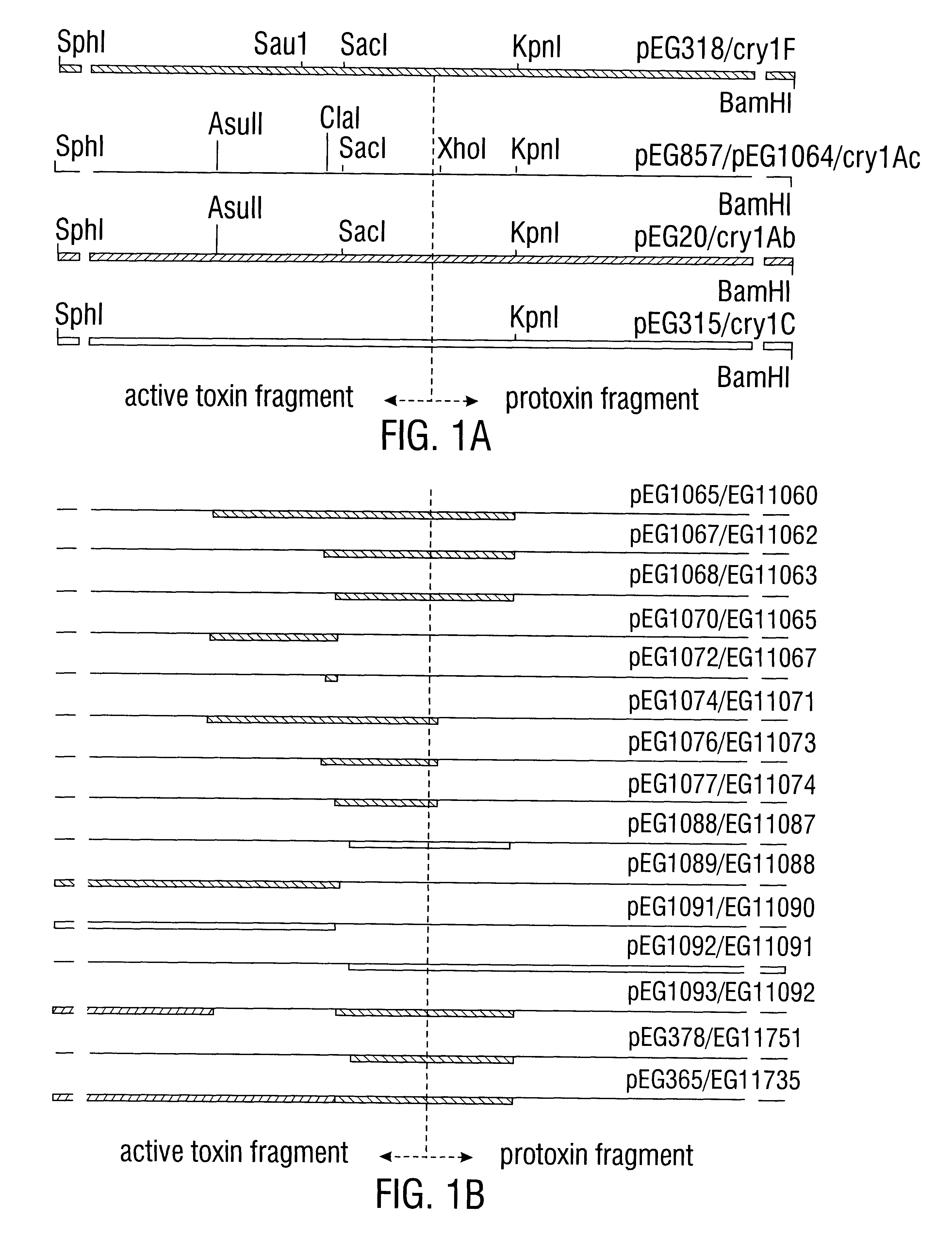Broad-spectrum insect resistant transgenic plants
a transgenic plant, broad-spectrum technology, applied in the field of new proteins for combatting insects, can solve the problems of eventual larvae mortality, osmotic imbalance, lysis of the cells lining the midgut epithelium, etc., and achieve the effect of broad-range specificity and improved insecticidal properties
- Summary
- Abstract
- Description
- Claims
- Application Information
AI Technical Summary
Benefits of technology
Problems solved by technology
Method used
Image
Examples
example 1
6.1 Example 1
Construction of Hybrid B. Thuringiensis .delta.-Endotoxins
The B. thuringiensis shuttle vectors pEG853, pEG854, and pEG857 which are used in the present invention have been described (Baum et al., 1990). pEG857 contains the Cry1Ac gene cloned into pEG853 as an SphI-BamHI DNA fragment. pEG1064 was constructed in such a way that the KpnI site within the cry1Ac gene was preserved and the KpnI site in the pEG857 multiple cloning site (MCS) was eliminated. This was accomplished by sequentially subjecting pEG857 DNA to limited KpnI digestion so that only one KpnI site is cut, filling in the KpnI 5' overhang by Klenow fragment of DNA polymerase I to create blunt DNA ends, and joining the blunt ends of DNA by T4 DNA ligase. pEG318 contains the cry1Fgene (Chanbers et al., 1991) cloned into the XhoI site of pEG854 as an XhoI-SalI DNA fragment. pEG315 contains the cry1C gene from strain EG6346 (Chambers et al., 1991) cloned into the XhoI-BamHI sites of pEG854 as a SalI-BamHI DNA fr...
example 2
6.2 Example 2
Production of the Hybrid Toxins in B. Thuringiensis
The plasmids encoding the hybrid toxins described in Example 1 were transformed into B. thuringiensis as described (Mettus and Macaluso, 1990). The resulting B. thuringiensis strains were grown in 50 ml of C-2 medium until the culture was filly sporulated and lysed (approximately 48 hr.). Since crystal formation is a prerequisite for efficient commercial production of .delta.-endotoxins in B. thuringiensis, microscopic analysis was used to identify crystals in the sporulated cultures (Table 4).
The .delta.-endotoxin production for some of the B. thuringiensis strains specified in Table 4 was examined by sodium dodecyl sulfate-polyacrylamide gel electrophoresis (SDS-PAGE) as described by Baum et al., 1990. Equal volume cultures of each B. thuringiensis stin were grown in C-2 mediumn until fully sporulated and lysed. The cultures were centrifuged and the spore / crystal pellet was washed twice with equal volumes of distilled...
example 3
6.3 Example 3
Proteolytic Processing of the Hybrid .delta.-endotoxins
Proteolytic degradation of the protoxin form of the .delta.-endotoxin to a stable active toxin occurs once .delta.-endotoxin crystals are solubilized in the larval midgut. One measure of the potential activity of .delta.-endotoxins is the stability of the active .delta.-endotoxin in a proteolytic environment. To test the proteolytic sensitivity of the hybrid .delta.-endotoxins, solubilized toxin was subjected to trypsin digestion. The .delta.-endotoxins were purified from sporulated B. thuringiensis cultures and quantified as described (Chambers et al., 1991) Exactly 250 .mu.g of each hybrid .delta.-endotoxin crystal was solubilized in 30 mM NaHCO.sub.3, 10 mM DEr (total volume 0.5 ml). Trypsin was added to the solubilized toxin at a 1:10 ratio. At appropriate time points 50 .mu.l aliquots were removed to 50 .mu.l Laemmli buffer, heated to 100.degree. C. for 3 min., and frozen in a dry-ice ethanol bath for subsequen...
PUM
| Property | Measurement | Unit |
|---|---|---|
| temperatures | aaaaa | aaaaa |
| temperatures | aaaaa | aaaaa |
| temperatures | aaaaa | aaaaa |
Abstract
Description
Claims
Application Information
 Login to View More
Login to View More - R&D
- Intellectual Property
- Life Sciences
- Materials
- Tech Scout
- Unparalleled Data Quality
- Higher Quality Content
- 60% Fewer Hallucinations
Browse by: Latest US Patents, China's latest patents, Technical Efficacy Thesaurus, Application Domain, Technology Topic, Popular Technical Reports.
© 2025 PatSnap. All rights reserved.Legal|Privacy policy|Modern Slavery Act Transparency Statement|Sitemap|About US| Contact US: help@patsnap.com

